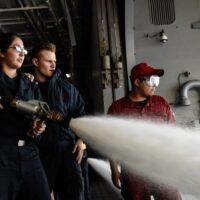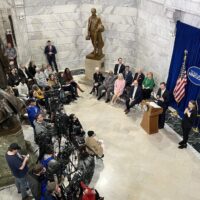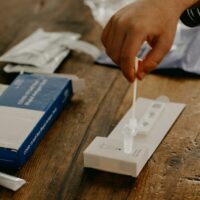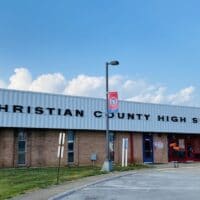Several colleges across western Kentucky have begun rolling out incentives for students and employees who get vaccinated against COVID-19, following a nationwide trend toward incentivizing vaccinations on college campuses.
These university-wide programs are similar to Kentucky’s “Shot at a Million” sweepstakes and those in other states. “Shot at a Million” ended on Friday after three drawings for $1 million and the award of 15 full scholarships to a Kentucky public higher learning institution.
Kentucky Wesleyan College was one of the first institutions in the state to launch an incentives program, offering $250 to all students who became fully vaccinated and submitted their vaccine cards before Tuesday.
“Since the beginning of the COVID pandemic, we as a college have tried to keep everybody safe as possible,” said Kentucky Wesleyan College President Thomas Mitzel said to the Messenger-Inquirer earlier this month. “Vaccines have shown to be the quickest and most effective way to keep everybody safe. That is a message we are trying to get across.”
Western Kentucky University (WKU) announced on Aug. 20 its incentives for students and employees who have received at least one dose of the vaccine. Those who report their vaccination status using the university’s online portal will be entered into drawings every Friday for the next five weeks.
Vaccinated WKU students could win tuition scholarships, book scholarships, WKU store gift cards, iPad Pros, parking permits or dining dollars. Vaccinated employees could win $1,000 awards, WKU store gift cards or iPad Pros.
Jace Lux, media relations director for WKU, said it’s too early to tell if the incentives will result in increased vaccinations, but he said 1,100 people had already provided their vaccination status within the afternoon when the incentives were announced.
“I’m hoping that a lot of people will take advantage [of vaccinations],” Lux said. “I think this program combined with the announcement that the FDA had given full approval to the Pfizer vaccine will hopefully provide individuals with some more confidence if they were hesitant.”
Lux said the university is prioritizing keeping the campus community safe, even if a small subset of the population may not trust the vaccines.
“Were there concerns about launching this program? No,” Lux said. “Did we know that some people would probably view this incentives program negatively? Absolutely, because we know that this is a divisive issue.”
Murray State University followed suit last week with incentives for students and employees who have received at least one dose of the vaccine. Those who report their vaccination status using the university’s online portal will be entered into drawings every Friday for the next four weeks.
Winners will have the option of receiving a parking permit, university store gift cards or dining dollars, and five students will be able to upgrade their current parking permit.
Student groups within six categories can also voluntarily compete with each other for $1,000 toward programming needs over the academic year. The student group with the highest percentage of vaccination among members within each category will receive the award.
Shawn Touney, executive director of marketing and communication at Murray State University, said in a statement he feels the vaccine incentive program may encourage more students to get vaccinated.
“We appreciate the support shown by many across campus since the announcement of this rewards program, particularly among our students and our Student Government Association,” Touney said.
Not every institution is incentivizing vaccines. Mary Hemlep, director of communication strategy for the Kentucky Community and Technical College System, said the statewide college network does not currently incentivize getting vaccinated but strongly encourages doing so.
State health officials report a continuing surge of COVD-19 cases, breaking records for the number of hospitalizations, with one hospital in Morehead setting up an outdoor tent to handle overflowing capacity for medical care.
In a recent social media post, Murray-Calloway County Hospital post said it was at capacity for ICU beds and ventilators, having to cancel elective procedures and potentially delay urgent procedures to create more space.
State health officials on Wednesday reported nearly 5,000 new COVID-19 cases, with more than 2,200 Kentuckians hospitalized. And as of Wednesday, more than 95% of intensive care unit capacity was occupied across hospitals in Ballard, Caldwell, Calloway, Carlisle, Crittenden, Fulton, Graves, Hickman, Livingston, Lyon, Marshall, McCracken, and Trigg counties.
Student organizations work toward vaccination
Murray State’s approach for incentives has partly been geared toward student organizations: the university is offering funding toward student organization activities for the organization that reaches the highest vaccination percent of their group.
Student Government Association (SGA) President Ian Puckett said the SGA passed a unanimous resolution on Aug. 18 to get 80% of the student body vaccinated. Vaccine card uploads will help the SGA determine the current percentage, though the working estimate is a “high 40% to low 50%” of students are vaccinated.
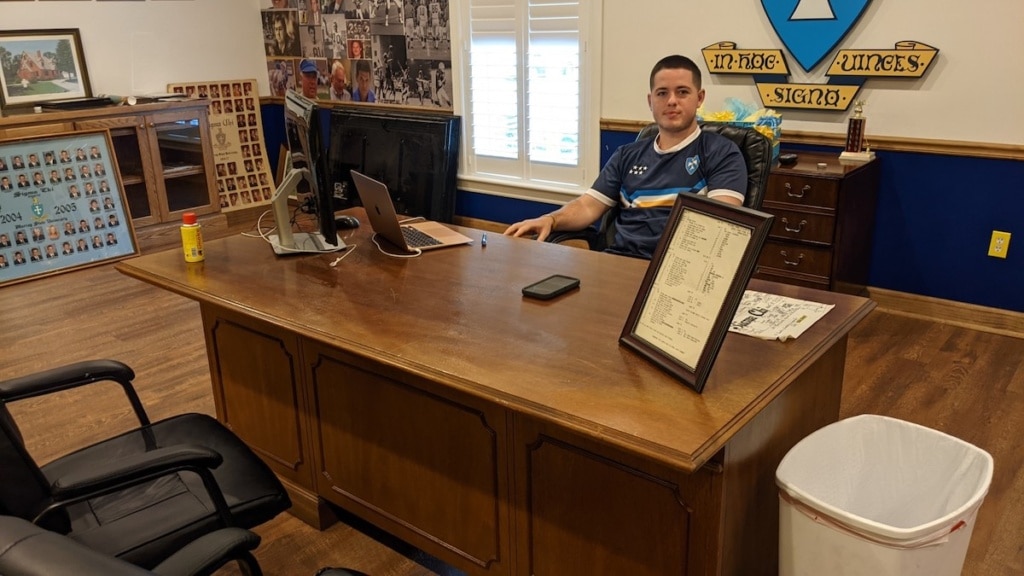
“The incentives, we feel, will be a good way to encourage some healthy competition among student organizations from various categories,” Puckett said. “I’ve heard plenty of people already say that they want that blue parking pass, or they want that thousand dollars for programming. Other than some minor confusion, there’s not been any people that have not been supportive of it, to my understanding.”
Tristan Cline, president of the Sigma Chi fraternity at Murray State, said he encouraged his chapter to get vaccinated after meeting with university representatives to discuss the incentives. He said he views the incentives less as a competition between organizations and more a means to protect the community.
“Everybody was already trending that way,” Cline said. “But after [the meeting] — plus the incentives, plus everyone wanting to get things back to normal, as well as the health benefits that it has for the community, and with this strain of COVID being more targeted toward a younger generation — the effects of it were clear. Vaccinations are helping, and if we could all get on the same page with that, we could probably get back to regular school.”
Cline said 17 out of 33 members are fully vaccinated so far — roughly 50% — but he doesn’t foresee the group reaching 100% vaccination.
“Upon going and talking to the guys, some do have those meaningful reasons [to not get vaccinated] that maybe aren’t mine in particular but have to be respected,” Cline said. “The vast majority were for it, and then, that would, in a sense, protect the few who have those reasons behind not having it.”
Social events won’t be restricted based on attendees’ vaccination status but could be hampered if the virus spreads, which Cline said is one reason to get vaccinated.
Students react to incentives
Some students, vaccinated or otherwise, have had varying reactions to schools’ vaccine incentives.
Garret Gallion, a freshman at Murray State, said he got vaccinated because he views it as something that can help society. He said the vaccine incentives don’t serve as much of a bonus for him, but they could encourage students who are “teetering on the edge” depending on the reason they haven’t been vaccinated.
“When you have people that are so ingrained in a certain mindset, they’re going to find anything they can to reinforce that,” Gallion said.
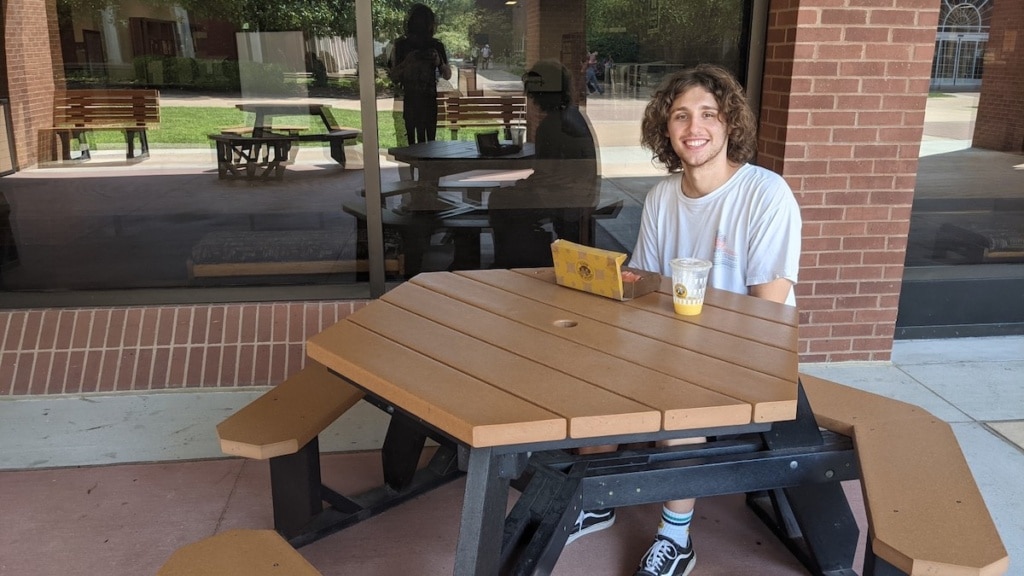
Madyson Birgbauer, a sophomore at Murray State, said she got vaccinated after some family members did to achieve “group immunity.” She said the incentives are “really good,” especially since they encourage keeping oneself and others safe.
“I think [the incentives] will help people that are like, ‘Well, I don’t really care enough to get [vaccinated],’” Birgbauer. “They’re going to be like, ‘Oh, now, if I get it, it’s free. They’re giving me opportunities to not have to leave campus, and I’m going to get free stuff possibly.’”
But Layla Russell, a sophomore at Murray State, said she has not yet been vaccinated because she wants to see the long-term effects of a vaccine before doing so. As an education major, she said she plans to get vaccinated only if it becomes required to work in schools, but she also said the incentives are “very compelling.”
“I think that it’s an interesting approach from the university to be doing that,” Russell said. “I think it’s definitely a fine line between what is okay and not okay. Obviously, they’re not requiring vaccines, and it’s still totally voluntary, so that’s good.”
Jacob Gray, a freshman at Murray State, said he has not yet been vaccinated and was not aware of the university’s incentives. Though he was on the fence, he said the incentives have swayed him to consider getting vaccinated to aid the public health cause.
“It should just be your will to get the vaccine,” Gray said. “Everyone should be getting it just to help out.”

